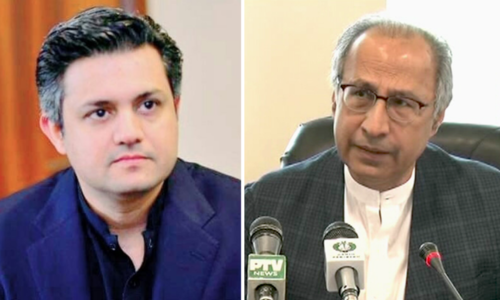THE abrupt ouster of Hafeez Sheikh as the ruling PTI’s finance minister has triggered a greater level of uncertainty about the economic governance of the country. On Monday, Prime Minister Imran Khan relieved Mr Sheikh of his responsibilities and handed them over to Industries Minister Hammad Azhar. Mr Sheikh had been skating on thin ice ever since his shock defeat at the hands of the opposition candidate Yousuf Raza Gilani in the Senate elections.
Read: Why did Hafeez Shaikh lose?
This election, as it turned out, was a do-or-die one for Mr Sheikh. As adviser on finance, he had been barred by the decision of the Islamabad High Court to chair important forums such as the National Finance Commission and the Economic Coordination Committee. The court in its decision had declared that unelected advisers could not perform executive functions and head ministries. To bypass this restriction, the government had made Mr Sheikh a minister through an ordinance. However, the ordinance was set to lapse in June, which meant that either he had to get elected before that, or pack his bags. The government considered finding another way to get him into the Senate but, as is clear from his sacking, it decided it was not worth the cost. For PTI, the liabilities that Mr Sheikh now carried outweighed the assets he had brought to the job.
The government’s decision to replace him could have been explained quite reasonably. It was, therefore, strange, and a bit unfortunate, that it decided to — rather ungraciously — throw Mr Sheikh under the bus. Government spokespersons were tutored to say that Mr Sheikh had been sent packing because he could not control the spiralling inflation in the country. Had this been the case, the government would not have cashed its chips in a bid to get him elected. If Mr Sheikh won, it is reasonable to expect that he would have stayed on in the job regardless of the inflation rate. Hafeez Sheikh deserved a better send-off than the one he was given.
That said, Hammad Azhar is not a surprise choice. He has performed well in his responsibilities over the last two years and won praise from the prime minister. He has also displayed a fairly good understanding of the subject and brings with him the political heft of an elected politician. It would be interesting to see whether he is provided a good team to repair the economy before the next general elections. The cabinet reshuffle that appears to be in the offing will indicate the priorities of the prime minister for the rest of his term. If the reshuffle is confined to replacing one tried and tested person with another, it may not inspire too much confidence. However if the prime minister brings in a radical change by ushering in fresh blood, it could mean that he is prepared to come out of his crease for the final overs.
Published in Dawn, March 31st, 2021













































